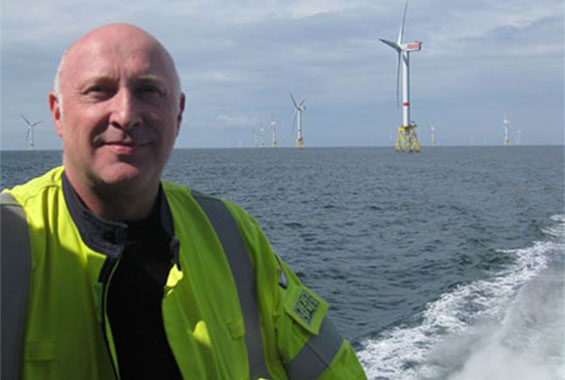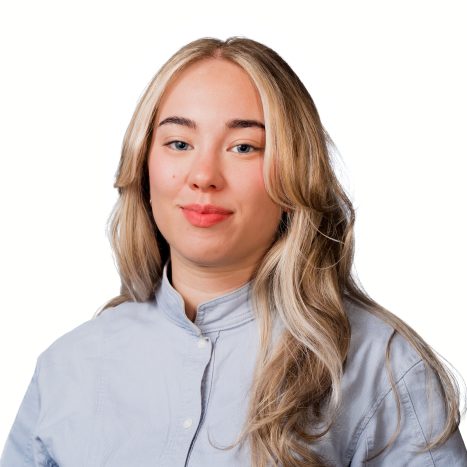Dirk has been working with us since 2002. Currently as Supervisor E/I Wind – Offshore Site Coordinator Wind. Dirk previously held various positions within Equans Offshore Services.
Can you tell us something about your background in combination with your position offshore or onshore?
From the weapons technical service in the Navy, my background is Electrical and Mechanical. Because of my interest in technology, I started working offshore at Equans after my service. There I became more involved in process technology, which was still unknown to me at that time. Technology is the same everywhere, only the applications differ. Knowledge in process measurement and control technology has been imparted through training and courses via Equans.
In 2002 I started as an E&I Technician (Electrical & Instrumentation) in the satellite team at one of our clients. Here we flew every day from the “central complex” (main accommodation platform) by helicopter to the various satellites. These satellites are positioned above the place where the gas rises from the ground and is transported via transport pipes to the various “treating centres” (gas treatment stations). Later I started working as a Senior E&I in a combination position. This means that the first week of my shift I was with the satellite team as a Senior and the following week as a Senior at a treating centre. I coordinated and distributed the work within the team. I have also done a similar combination function between 2 different treating centres.
Between 2012 and 2014 I was part of a rotating team where we increased the reliability and availability of gas turbines and compressors.
When Equans also started wind energy shortly afterwards, I switched from oil & gas to offshore wind within the company. For the first few years I was Site Coordinator for a client in German-Danish Bight. Later I also worked for other clients in England and Germany.
Energy challenge at Equans Offshore Services

What do you find important in your work?
You work and live with a group of select people in a small space. The atmosphere, collegiality and good cooperation are very important. If you enjoy your work and with your colleagues, the 2 weeks will be over in no time. In addition, safety is also very important to me because after a 2-week shift I obviously want to return to my family safe and sound!
What are your duties and what do you like about your work?
The great thing about my work is that it is so diverse. Sometimes I work in the wind, other times in oil & gas. The position I work in also differs per customer.
Despite different positions at different customers, the structure of shifts and working days is generally the same. When your shift starts, you first look ahead to see what work needs to be carried out during your shift. Is there any work coming up that requires specific preparations? Are all permits and risk analyses ready? We cannot quickly obtain materials offshore, so we must check at least 1½ weeks in advance whether all (correct!) materials are present. If we miss something, we can still have it come with the next boat or helicopter.
Because we often do not only work with our own crew on board, we start in the morning with a work meeting (also called a “Toolbox”) where everyone is present. This allows us to prevent different people from working in the same place without knowing each other what work is going on. Then I will discuss their work with my own people. When everyone is busy, I usually go to the control room to watch the process. Is everything running smoothly or are there fluctuations visible? This could be anything; a level in a vessel, vibration on a turbine or heat in a room. On a platform, the costs of an unwanted process stop are very high. If, for whatever reason, a stop does occur, it will have the highest priority, taking into account safety, and it should have been resolved yesterday, so to speak 😉
On board, you and your mechanical colleague(s) are responsible for the entire technical installation. This varies from the cook’s bedside lamp to the vibration measurement of a turbine. So it is not surprising that a lot of unplanned work occurs.
I also function on board as part of the ERT (Emergency Response Team) and HLO/HDA ((Helicopter Landing Officer / Helicopter Deck Assistant).
During the day I check the work in progress. Will the work be completed, or should it be rescheduled for the next working day? I also check the work for the shift after me, or the major stops planned even further away. Is everything okay for the colleague after me? Does material need to be selected or requested for the stops? If everything is well prepared, all work can be carried out better.
At the end of the working day we have a meeting with the customer about the progress made and what we want to do the next day. After the discussion we will take a look at what the chef has made and relax for a while, hoping that the lights will stay on. It is not an 8 to 5 job, so if something happens at night we also have to work. But after those 2 weeks we go home again. That free time is priceless!
What attracts you to working offshore?
Diversity of work. There are no routines in your work, no day is the same. It is a dynamic company. You wake up at work. No traffic jams by car or delays on the train.
What is also special is the unique view that you do not have at any other workplace; view to the horizon. What people normally dream about; we see every day.


